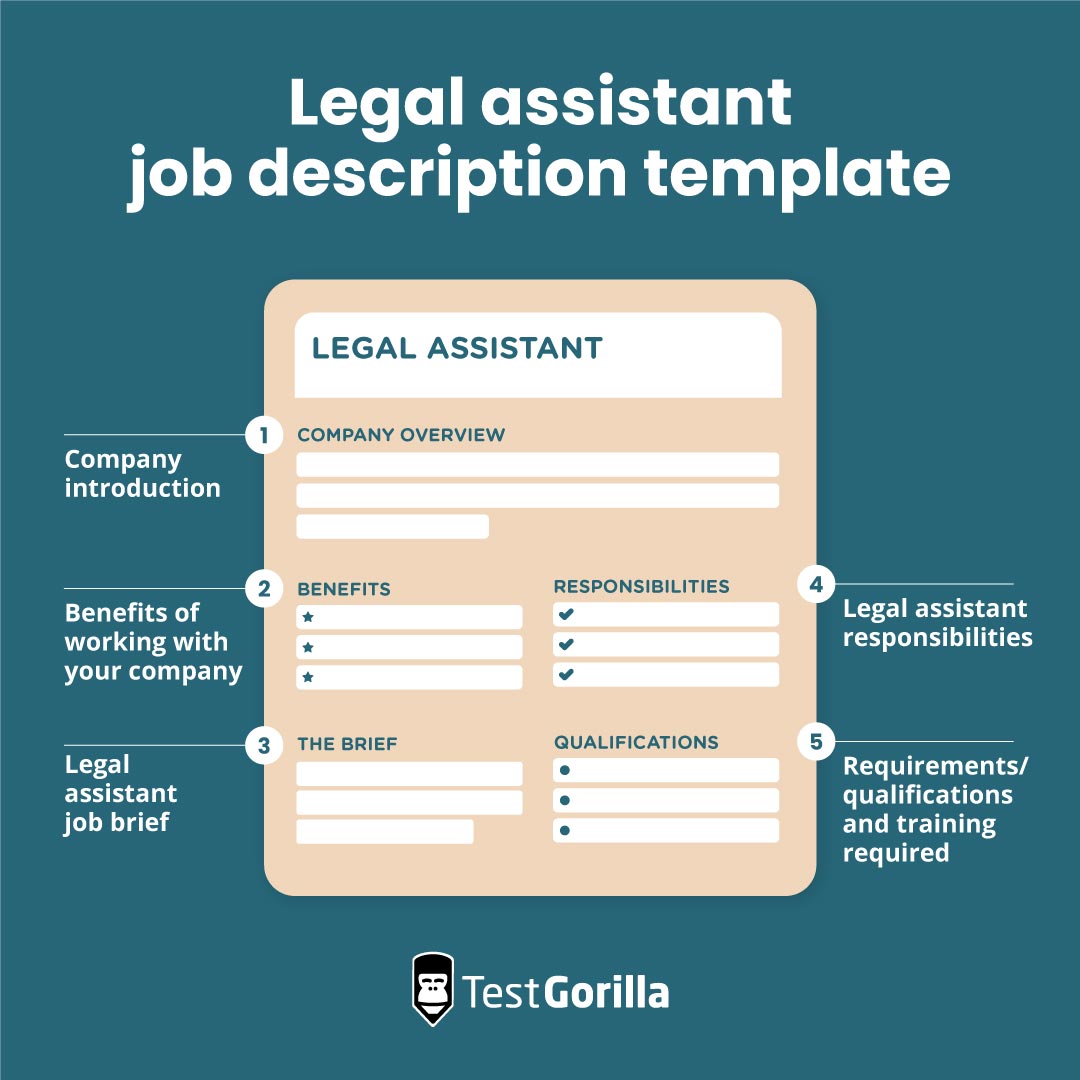An effective job description is key to finding the right person for this crucial role. Hiring the wrong legal assistant can result in missed deadlines, errors in legal documents, and disgruntled clients. Mistakes like these can have a devastating impact on your firm’s reputation and also raise potential professional liability issues.
In this article, we step through how to create a compelling legal assistant job description and discuss the top three pitfalls to avoid. We’ve also included a handy template to get you started with hiring the right legal assistant for your firm.
Table of contents
- What is a legal assistant?
- Key skills to look for in legal assistants
- How to write an effective legal assistant job description
- Legal assistant job description template
- Three things to avoid when writing a job description for legal assistants
- Next steps: Attracting and assessing legal assistant candidates
- FAQs
- Finding the top legal assistants with TestGorilla
What is a legal assistant?
A legal assistant works alongside lawyers, completing the routine administrative tasks associated with legal work.
These tasks include drafting correspondence, transcription, filing, diary management, answering client calls and emails, setting up internal and client meetings, proofreading materials, generating bills, and communicating with the court regarding practical issues like court dates.
Key skills to look for in legal assistants
An excellent legal assistant typically possesses a combination of hard and soft skills, including:
Legal knowledge and experience: Understanding commonly used legal terminology and basic legal procedures.
Legal research skills: Using legal databases like LexisNexis and Westlaw to locate case law, precedents, and statutes.
An understanding of confidentiality and other ethical principles: Handling sensitive and confidential information following relevant laws and professional standards.
Experience with common legal software: Proficiency in document management systems like Clio or PandaDoc, legal billing software, case management software, and electronic court filing systems.
Attention to detail: Producing accurate and error-free work.
High-level organizational skills: Juggling multiple tasks and deadlines.
Time management skills: Managing schedule deadlines to ensure compliance with court, filing, and hearing dates.
Strong communication skills: Clear and professional communication with clients and colleagues.
Interpersonal skills: Ability to build professional relationships and work effectively within a team, working alongside lawyers and other legal and non-legal support staff.
How to write an effective legal assistant job description
A good job description communicates role expectations and entices qualified candidates to apply. Here are some best practices to employ.
Be specific
While avoiding overly narrow criteria, it’s good to be precise about your requirements to attract qualified candidates. For example, if you’re looking for a candidate with experience in a particular legal billing software, specify the software rather than requiring “good IT skills.”
Use inclusive language
Encourage diversity in your applicant pool by using gender-neutral language. For example, terms like “the legal assistant” or “they” instead of “he” and “she.”
Avoid other coded language that could suggest a bias towards certain candidates. For instance, describing the ideal candidate as “a recent graduate” implies you’re looking for a younger person and may deter older applicants.
Use a template
Using a job description template helps to streamline your hiring process and keep it consistent. It ensures you include all the necessary details, clearly setting out relevant information, such as responsibilities and requirements, to attract suitable candidates.
Legal assistant job description template
A well-written job description outlines information about your company, the role, and the skills and attributes of the ideal candidate. Use this template to guide your writing.
Company introduction
Presenting your company helps the candidate assess whether it’s a good fit for them. You can include your law firm or company’s mission statement, culture and core values, history, and practice areas.
Benefits of working with [your company]
This section outlines the benefits you offer employees that set your firm apart from the competition. These may be related to pay, such as a competitive salary, generous paid time off, dental and health benefits, and retirement plans.
You can also mention non-pay-related perks, like recognition and rewards, professional development opportunities, and family-friendly policies such as flexible working arrangements.
Legal assistant job brief
[Company name]
Role Title: [For example, Junior Legal Assistant, Family Law Legal Assistant, Legal Administrator, or Legal Support Officer]
Reports to: [For example, Family Law Attorneys, In-House Counsel, or Practice Manager]
Position Type and Location: [Full-time, part-time, on-site, remote, or hybrid]
[Compensation details, including salary and benefits]
Job Overview: [A brief paragraph describing the role, what success in the position looks like, and how it fits into the company or organization overall]
Legal assistant responsibilities
Provide administrative support to a team of [four] [family law attorneys], including diary management, travel arrangements, and client communications
Conduct legal research using online databases and legal libraries to assist attorneys with case preparation
Draft, format, and proofread correspondence and basic legal documents, ensuring accuracy and consistency
Maintain the client database (Clio software) and physical client files, handling data in accordance with privacy and confidentiality laws and regulations
Prepare and process client invoices and expense reports
Requirements/qualifications and training required
High school diploma or equivalent
Familiarity with the Clio case management system
Minimum three years’ experience in family law
Understanding of legal ethics, including the application of the American Bar Association’s Model Rules of Professional Conduct and the New York State Bar’s Rules of Professional Conduct
Three things to avoid when writing a job description for legal assistants
There are several pitfalls to look out for when writing your legal assistant job description that can undermine your recruitment efforts.
Overly demanding requirements
While it’s important to be specific in your job post, be mindful of creating a narrow or unrealistic set of criteria that discourage candidates from applying. For example, requiring 15 years of experience for a legal assistant role is unnecessary and automatically rules out younger candidates with the necessary skills and experience.
Excessive legal jargon
While legal assistants need to be familiar with legal jargon, a job description isn’t the place to test them. Using too many legal terms or acronyms can be overwhelming to candidates and isn’t engaging to read. Instead, rely on straightforward language to paint a picture of your ideal candidate and communicate clearly with potential applicants.
Not including compensation details
Most job descriptions include salary information, either a specific range or a reference to a “competitive salary.” Without this, you risk losing suitable candidates, as they might doubt whether proceeding with their application is worthwhile.
Next steps: Attracting and assessing legal assistant candidates
After an initial review of the applications you’ve received, it’s time to dive deeper into candidates’ skills and abilities. A great way to do this is with pre-employment testing.
TestGorilla enables you to create tailored assessments that help you find the best person for the job. Our extensive test library contains more than 300 tests for cognitive abilities, personality, role-specific skills, situational judgment, and typing speed. This choice lets you thoroughly evaluate legal assistant skills and get a fuller picture of your candidates.
Consider using the following tests in your assessment:
Legal Assistant test: Evaluates client management skills and professionalism
Legal Research and Writing test: Identifies candidates with strong legal research and writing skills
Attention to Detail test: Evaluates candidates’ ability to thoroughly, accurately, and consistently process information
Communication test: Assesses professional and effective communication
Culture-Add test: Gain insights into candidates’ values and behaviors and whether they align with your firm’s culture
Typing Speed test: Measures candidates’ typing speed in words per minute (WPM)
FAQs
What’s the difference between a legal assistant and a paralegal?
Although “legal assistant” and “paralegal” are often used interchangeably, they have some key differences. While paralegals also assist lawyers, they typically perform more legally focused tasks such as drafting, under the supervision of a lawyer.
Do legal assistants require a law degree?
Legal assistants don’t need a law degree. Some firms prefer their legal assistants to possess a legal qualification, such as an associate’s degree in paralegal studies or legal studies. However, many simply require a high school diploma.
Finding the top legal assistants with TestGorilla
Legal assistants work in legal teams to support the fee-earning work of lawyers by performing administrative tasks like preparing correspondence, filing, and diary management. The first step to finding top legal assistant candidates is crafting a compelling and clear job description.
Once you’ve received the applications, you can create a shortlist of applicants. TestGorilla is the ideal tool to help you with this. With more than 300 scientifically designed tests to assess cognitive ability, personality, and job-specific skills, TestGorilla delivers deep, unbiased insights into candidates.
Want to learn more about how TestGorilla can help you streamline your hiring process and find top talent? Take our product tour or sign up for a free account to get started today.
Related posts
Hire the best candidates with TestGorilla
Create pre-employment assessments in minutes to screen candidates, save time, and hire the best talent.
Latest posts
The best advice in pre-employment testing, in your inbox.
No spam. Unsubscribe at any time.

Hire the best. No bias. No stress.
Our screening tests identify the best candidates and make your hiring decisions faster, easier, and bias-free.
Free resources
This checklist covers key features you should look for when choosing a skills testing platform
This resource will help you develop an onboarding checklist for new hires.
How to assess your candidates' attention to detail.
Learn how to get human resources certified through HRCI or SHRM.
Learn how you can improve the level of talent at your company.
Learn how CapitalT reduced hiring bias with online skills assessments.
Learn how to make the resume process more efficient and more effective.
Improve your hiring strategy with these 7 critical recruitment metrics.
Learn how Sukhi decreased time spent reviewing resumes by 83%!
Hire more efficiently with these hacks that 99% of recruiters aren't using.
Make a business case for diversity and inclusion initiatives with this data.




















